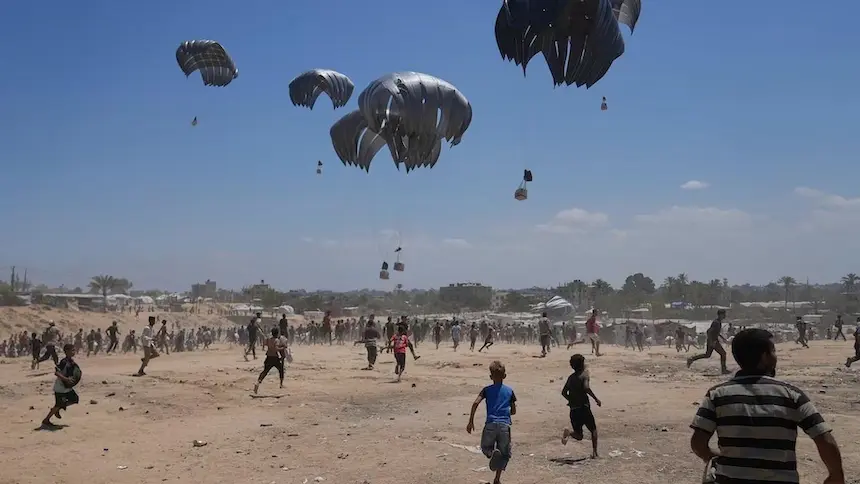
Canada executed its first-ever humanitarian airdrop over Gaza, delivering 21,600 pounds of aid to Gaza
A Bold Flight of Humanitarian Defiance
Canada’s Historic Gaza Airdrop – In a move that has reverberated across diplomatic circles, Canada executed its first-ever humanitarian airdrop over Gaza, delivering 21600 pounds of aid to a region devastated by nearly 22 months of conflict and blockade. The Canadian Armed Forces deployed a CC-130J Hercules aircraft to carry out the mission, marking a dramatic shift in Ottawa’s approach to the Israeli-Palestinian crisis.
This act wasn’t just about delivering food and medicine, it was a political statement. Canada joined five other nations Jordan, UAE, Egypt, Germany, and Belgium in defying Israeli restrictions that have choked land routes and obstructed humanitarian access. Ottawa’s message was clear: “The obstruction of aid is a violation of international humanitarian law and must end immediately”.
The airdrop stunned Israeli officials, who had no immediate comment. But the symbolism was unmistakable. Canada, traditionally a cautious player in Middle East diplomacy, had taken a decisive stand—one that could reshape its role in the region.
Blockade, Starvation, and the Breaking Point
Since March 2023, Israel has imposed severe restrictions on aid entering Gaza, citing concerns that supplies were being diverted by Hamas. Although some restrictions were lifted in May, humanitarian agencies continued to face bureaucratic hurdles, delayed clearances, and limited access to key crossings.
The result has been catastrophic. Gaza’s health ministry reports over 60,000 Palestinian deaths since the conflict reignited in October 2023, following a Hamas-led attack on Israel. The blockade has triggered a hunger crisis, displaced nearly the entire population, and led to accusations of genocide and war crimes at international courts.
Canada’s decision to bypass land routes and deliver aid by air was born out of frustration. Prime Minister Mark Carney and Foreign Affairs Minister Anita Anand cited the deteriorating humanitarian conditions and Israel’s continued obstruction as reasons for the airdrop. Anand emphasized that Canada would “intensify efforts with international partners to develop a credible peace plan” and ensure aid reaches Palestinians “at the necessary scale”.
Diplomatic Ripples: Recognition of Palestine on the Horizon?
The airdrop is just one part of Canada’s evolving stance. In a stunning announcement, Ottawa revealed plans to recognize the State of Palestine at the upcoming United Nations meeting in September. This marks a dramatic departure from Canada’s previous position, which favored recognition only after peace negotiations.
Carney stated that recognition would be conditional on the Palestinian Authority undertaking reforms and holding elections for the first time in two decades. Still, the timing and tone of the announcement suggest that Canada is no longer willing to wait for a peace process that has stalled for years.
This shift has drawn both praise and criticism. Pro-Palestinian groups hailed the move as overdue, while critics warned it could strain Canada’s relationship with Israel and complicate its role in broader Middle East diplomacy.
Meanwhile, Israel continues to deny accusations of violating international law and blames Hamas for the suffering in Gaza. The Israeli military claims it is taking steps to improve aid access, including pausing fighting in some areas and establishing protected routes for convoys. But for many, these measures have come too late—and Canada’s airdrop is seen as a rebuke of Israel’s handling of the crisis.
A Turning Point or a Tactical Gesture?
The question now is whether Canada’s actions represent a turning point or a tactical gesture. Airdrops, while dramatic, are often criticized for being inefficient and dangerous. UN agencies have warned that pallets can fall into the sea or injure civilians on the ground. Aid experts argue that truck convoys remain the most effective way to deliver large-scale relief.
Still, the symbolism of Canada’s airdrop cannot be ignored. It signals a willingness to challenge traditional alliances and assert moral leadership. It also reflects growing international frustration with the status quo in Gaza.
Canada’s next steps will be closely watched. Will it follow through with recognition of Palestine? Will it push for reforms within the Palestinian Authority? And how will it navigate the diplomatic fallout with Israel?
For now, one thing is clear: the skies over Gaza have become a new frontier in the battle for humanitarian justice. And Canada, once a quiet observer, has taken flight.
Refugee status to Gazans? France’s Bold Asylum Shift for Gaza
Gaza Humanitarian Crisis Deepens: Israel’s Evacuation Orders and the Tragedy of Aid Seekers